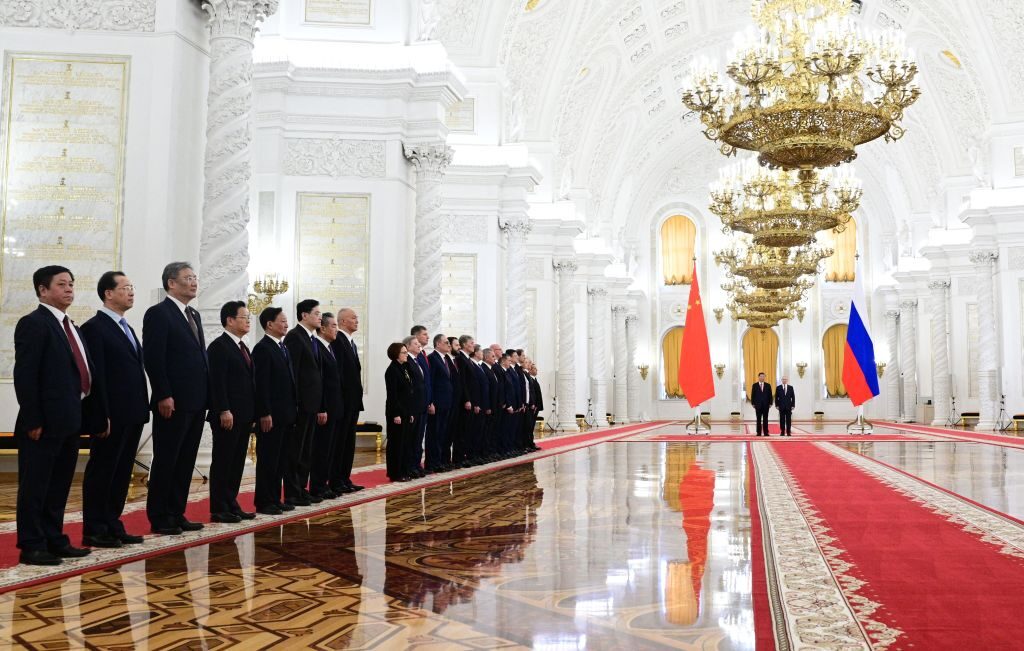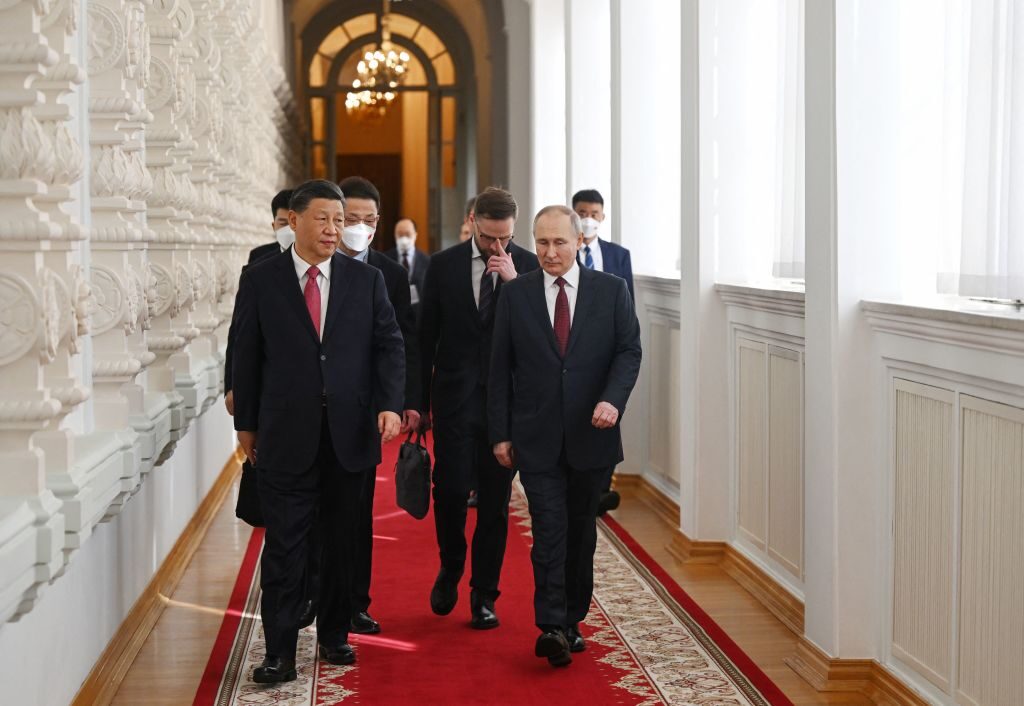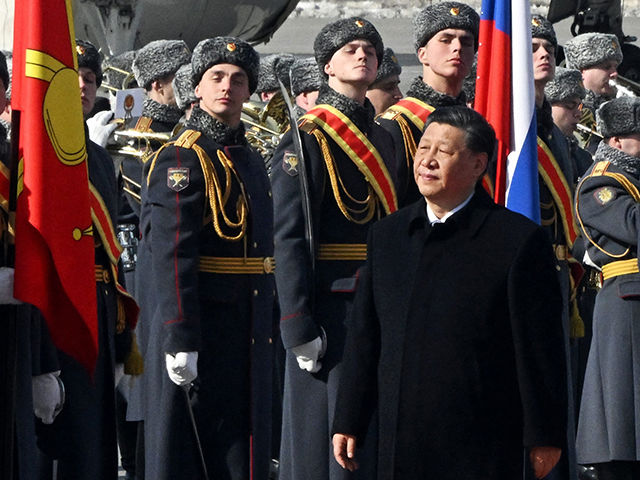Chinese dictator Xi Jinping emphasized on Monday that his visit with Russian leader Vladimir Putin, charged with human rights crimes before the International Criminal Court (ICC) less than a week ago, is intended to promote “friendship, cooperation, and peace,” positioning China as a mediator in the ongoing invasion of Ukraine.
Xi will be in Moscow from Monday to Wednesday, meeting with Putin and other senior leaders. Xi has emphasized China’s potential role in the Ukraine crisis since arriving, promoting a Chinese “peace plan” debuted last month that demands a ceasefire, lays no blame on either side, and does not offer specificity on its demand for both sides to “calm down as soon as possible.”
Arriving on Monday, Xi vowed that China would “stand guard over the world order,” hinting at ambitions to mediate the Ukraine conflict.
Both Russia and Ukraine have offered tepid reactions to the peace plan but have encouraged Beijing to get more involved in the conflict in the role of mediator. If successful in halting some of the hostilities, Xi could use Ukraine to greatly elevate China’s international reputation as peacemaker, even as China continues to execute a years-long genocide on its own people.
The Russian news agency Tass reported that his first meeting with Putin on Monday lasted 4.5 hours and, Kremlin spokesman Dmitry Peskov told reporters, “obviously” addressed Russia’s invasion of Ukraine. Xi and Putin will return to talks at 3 p.m. local time on Tuesday, Peskov added, regarding both countries’ bilateral ties and the Ukraine invasion.

Russian President Vladimir Putin meets with China’s President Xi Jinping at the Kremlin in Moscow on March 21, 2023. (PAVEL BYRKIN/SPUTNIK/AFP via Getty Images)
The Chinese state propaganda newspaper Global Times proclaimed that the visit, Xi’s first foreign trip of the year, could elevate China’s position in the Ukraine conflict to that of successful mediator, as China “has confidence in helping the conflicting parties realize a ceasefire and restart peace talks” following its meddling in the decades-long feud between Iran and Saudi Arabia. The two Middle East countries announced in mid-March that they had agreed, after extensive talks in Beijing, to reestablish diplomatic relations, including the reopening of their embassies and establishing ambassador-level representation in their capitals.
China is one of Russia’s closest allies – arguably, its most prominent and reliable – but also maintains close relations with Ukraine. Ukraine is a member of China’s Belt and Road Initiative (BRI), a global infrastructure plan to indebt impoverished nations, and its president, Volodymyr Zelensky, has repeatedly made overtures to Xi for personal talks, to no avail.
“For decades, the Ukrainian-Chinese relations have been based on mutual respect, understanding and benefit,” top Ukrainian diplomat Dmytro Kuleba said in March 2022, shortly after Russia launched its full-scale invasion of the country. “We share Beijing’s position on the need to find a political solution to the war against Ukraine and call on China as a global power to play an important role in this effort.”
Kuleba reportedly spoke to Chinese Foreign Minister Qin Gang last week, a conversation during which Qin assured Kuleba that communist China “stands ready to work with Ukraine to promote sustained and stable development of bilateral relations with a long-term perspective.”
“China is concerned that the crisis has dragged on and escalated and may even spiral out of control, and hopes that the relevant parties will stay cool-headed and rational, exercise restraint, resume peace talks as soon as possible,” Qin said, according to the Chinese Foreign Ministry, “and return to the track of political settlement.”
The Global Times, citing Chinese regime-approved “experts,” said on Monday that Xi was sending “a clear signal to the world” that China is ready to “bring hope for a peaceful solution of the complicated ongoing crisis” in Ukraine.

Russian President Vladimir Putin meets with China’s President Xi Jinping at the Kremlin in Moscow on March 21, 2023. (GRIGORY SYSOYEV/SPUTNIK/AFP via Getty Images)
“If there is a country able to play a role in mediating the Ukraine crisis, it has to be a country with a true neutral stance and a position of justice, and the US has already lost this position,” the Global Times claimed, “so in the next stage, China will keep making efforts for mediation, and during Xi’s visit to Russia, the world will hold high expectations of what progress China will make with Russia.”
Chinese Foreign Ministry spokesman Wang Wenbin similarly suggested China was interested in a prominent position of dialogue in Ukraine, one that could greatly benefit China, during his regular press briefing on Monday. Wang was responding to questions about the purpose of Xi’s visit to Moscow and the ICC’s arrest warrant for Putin.
“Our position has always been that dialogue and negotiation provides the fundamental way out for the Ukraine crisis,” Wang said, “and that the international community needs to play a constructive role in peacefully resolving the Ukraine crisis, and do more in ways that are conducive to talks for peace, deescalation and mediation efforts.”
Wang reiterated Xi’s words that the visit was one of “friendship,” “cooperation” and “peace.”
On Tuesday, the Chinese Foreign Ministry published a summary of the nearly five-hour discussion between Xi and Putin that stated Xi emphasized his enthusiasm for interjecting China in the Ukraine invasion.
“China believes that the more difficulties there are, the greater the need to keep space for peace. The more acute the problem is, the more important it is not to give up efforts for dialogue,” Xi reportedly said. “China will continue to play a constructive role in promoting the political settlement of the Ukraine issue.”
The Chinese Foreign Ministry claimed that Putin said Russia had “carefully studied China’s position paper on the political settlement of the Ukraine issue and is open to talks for peace. Russia welcomes China to play a constructive role in this regard.”
The Kremlin published a transcript of the public statements the two leaders made to the press on Monday that did not mention Ukraine.

COMMENTS
Please let us know if you're having issues with commenting.